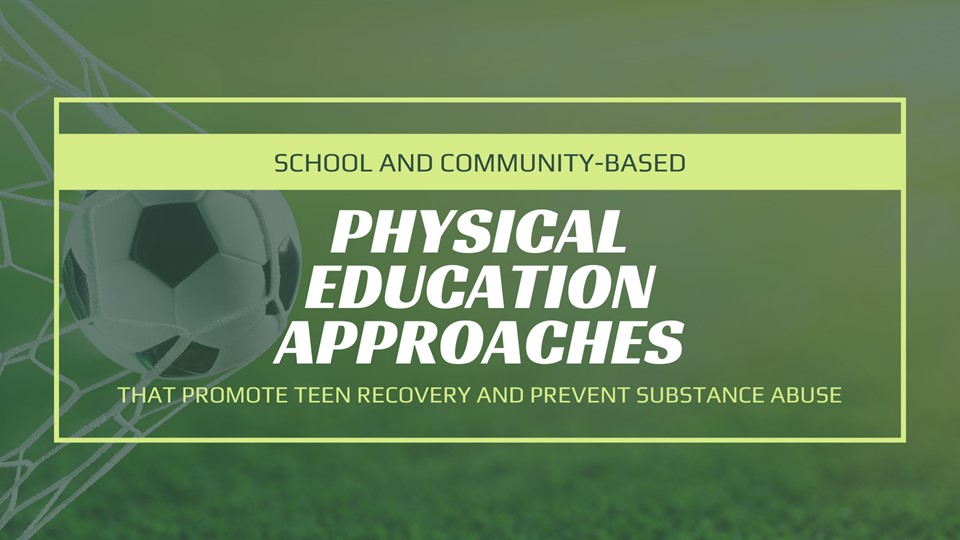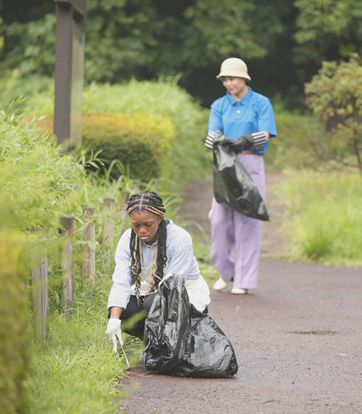Physical Activity to Support Teens in Recovery
 Introduction
Introduction
Watch a video presentation or download Powerpoint slides on the information that follows below.
School based mental health education, counseling, support groups and connection to community clinical resources are critical for teens who are at risk for/or experiencing substance use disorder. Physical activity and movement and mindful connection with the outdoors also plays a crucial role in promoting teen recovery from substance abuse and our school-communities can support youth access to these resources.
 Benefits
of Physical Activity and Spending Time in Nature
Benefits
of Physical Activity and Spending Time in Nature
Spending time in nature and engaging in physical activity can be beneficial for promoting teen recovery from substance abuse. Experience in the natural environment and physical activity provide a number of positive benefits that support the recovery process, including:
- Reduced stress and anxiety: Spending time in nature and participating in physical activity can reduce stress and anxiety levels, which are common challenges for individuals in recovery. This can help to improve overall mental health and well-being.
- Improved physical health: Physical activity can help improve overall physical health, which can be negatively impacted by substance abuse. Regular physical activity can help build strength, increase energy levels, and improve overall fitness, which can be crucial in the recovery process.
- Increased self-esteem and confidence: Engaging in physical activity and spending time in nature can also boost self-esteem and confidence levels. This can be especially important for teens in recovery, as they may feel a sense of low self-worth due to their substance abuse.
- Enhanced mood and emotional well-being: Physical activity and spending time in nature can also improve mood and emotional well-being. This can help individuals in recovery manage negative emotions and reduce the risk of relapse.
- Improved sleep quality: Physical activity and spending time in nature can also improve sleep quality, which is an important factor in recovery. Quality sleep can help reduce stress levels, improve mood and emotional well-being, and promote overall physical health.
- Increased sense of purpose: Participating in physical activities and spending time in nature can also provide individuals in recovery with a sense of purpose and a feeling of accomplishment. This can help boost self-esteem and provide a sense of direction in recovery.
School and Community-based Approaches
Below are school and community-based approaches for parents and educators to utilize support teen recovery. They are all grounded in movement and physical activity and build healthy habits, manage stress, and promote physical and emotional well-being - critical components of recovery from substance abuse.
- Incorporate physical activity into the curriculum: Incorporate physical activity into the school day by offering physical education classes, or by incorporating movement and physical activity into other subjects. This can help increase youth’s overall activity levels and provide them with opportunities to engage in healthy physical activity.
- Encourage outdoor activity: Encourage youth to spend time outside and engage in outdoor physical activity. This can include encouraging recess and outdoor physical education classes, or organizing field trips that involve outdoor activities such as hiking or camping.
- Promote healthy lifestyle habits: Promote healthy lifestyle habits, such as eating nutritious foods, getting enough sleep, and avoiding substance use. These habits can have a positive impact on overall health and well-being and can help reduce the risk of substance abuse.
- Teach stress-management techniques: Teaach kids stress-management techniques, such as mindfulness, yoga, and deep breathing, which can help reduce stress and anxiety levels. These techniques can also be incorporated into physical education classes, making them more accessible and appealing to kids.
- Partner with community organizations: Partner with community organizations to provide kids with opportunities for physical activity and healthy lifestyle habits. This can include partnering with local sports teams, parks and recreation departments, or community health organizations to provide kids with access to physical activity programs and resources.
- Model healthy behaviors: Focus on modeling healthy behaviors themselves, such as engaging in regular physical activity, eating nutritious foods, and avoiding substance use.
 School
and Community Programming
School
and Community Programming
- Physical Education (PE) Classes: PE classes in schools can promote healthy habits and provide an outlet for physical activity and exercise. Incorporating activities that focus on stress relief and relaxation, such as yoga or tai chi, can also be beneficial for teen recovery.
- Sports Teams: Joining a school or community sports team can provide a positive outlet for physical activity and social interaction. It can also help build self-esteem and confidence.
- Outdoor Adventure Programs: Outdoor adventure programs, such as hiking, camping, and rock climbing, can provide a physical and mental challenge, as well as an opportunity to connect with nature and build resilience. These camps provide youth with:
-
- opportunities to learn new skills, such as outdoor survival skills, teamwork, and leadership, which in turn can help build confidence, self-esteem, and a sense of self-worth.
- a supportive and positive social environment, which can help reduce feelings of loneliness and isolation.
- opportunities to make new friends and build meaningful relationships, which can be important for overall well-being.
- opportunities to engage in mindfulness and learn other stress-management techniques, such as yoga and meditation.
- Martial Arts: Martial arts can provide kids with many benefits that can help reduce the risk of substance abuse. By improving physical fitness, promoting mental focus and discipline, providing social support, teaching anger management skills, and promoting healthy habits, martial arts can help youth avoid substance use and lead healthy, fulfilling lives.
-
- The high level of physical activity and exercise in martial arts improves physical fitness, reduce stress, and boost overall health and well-being.
- Martial arts require mental focus and discipline, which can help build skills that can be applied in other areas of life, including avoiding substance use.
- The focus and discipline required in martial arts can help kids build self-confidence, self-esteem, and a sense of self-worth.
- Martial arts can provide kids with a supportive and positive social environment as well as a sense of belonging and community. This can help reduce feelings of loneliness and isolation, which can be risk factors for substance abuse.
- Dance or Movement Therapy: Dance or movement therapy can provide an opportunity for teens to express themselves creatively and physically and can also help them manage emotions and develop stress-management skills.
- Group Fitness Classes: Joining a group fitness class, such as a fitness boot camp or an exercise class, can provide a structured and supportive environment for physical activity and can also help build a sense of community and accountability.
- Volunteer Opportunities: Volunteer opportunities, such as working on a community garden or participating in a neighborhood clean-up, can provide a sense of purpose and engagement, as well as an opportunity for physical activity.
In summary, spending time in nature, engaging in physical activity, and connecting socially with others can be important components of a comprehensive approach to teen recovery from substance abuse. These activities can provide numerous positive benefits that support the recovery process and promote overall health and well-being.

